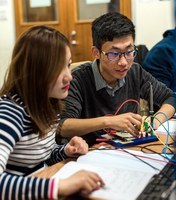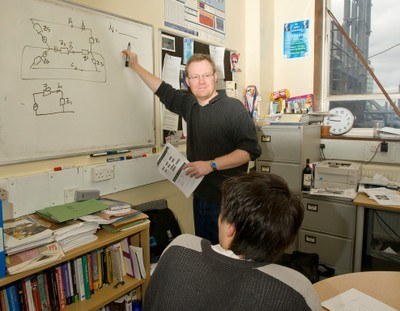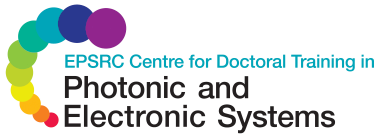Master of Research (MRes) - year 1
The Master of Research (MRes) one year programme aims to provide students with the scientific skills and knowledge necessary to undertake research effectively.

About the MRes degree
The MRes programme consists of taught modules and research projects delivered at both UCL and University of Cambridge, with the participation of industry. This provides students with an understanding of the applications, systems and business drivers as well as the underpinning scientific and engineering material required for photonic systems research at the highest level. Students who successfully pass the MRes can progress onto the PhD programme.
The MRes programme allows a high level of flexibility. Students have a wide choice of modules, projects, supervisors and subject areas across both partner universities.
The CDT also engages closely with the following departments, institutes and centres:
UCL |
University of Cambridge |
|---|---|
|
Departments of Computer Science, Electronic and Electrical Engineering, Physics, Management Science and Innovation and Medical Physics and Bioengineering. London Centre for Nanotechnology. |
Faculty of Engineering (including Civil Engineering, Electrical Engineering and Manufacturing). Departments of Materials Science, Chemical Engineering and Biotechnology. Cambridge Computer Laboratory. Judge Business School. |
A research focused degree
The focus of this graduate degree is on undertaking research. From the outset, much like postdoctoral researchers, you will use recently acquired knowledge to work directly on active research problems. You will also have the opportunity to make a head start in your research career through organising conferences and publishing papers.
Structure

Module based training
Students will be able to draw upon, in consultation with their assigned first year advisor, a wide range of existing specialised courses and new taught courses (including electronics and biotechnology modules) developed specifically for the Centre. This will have both foundation training in the scientific basis of photonics and systems, and an individual bespoke programme, taking into account the student’s pre-existing experience and future interests. There will be three forms of modules: (i) Technical modules, (ii) Innovation and Business Modules and (iii) Transferable skills Modules (including experience presenting your research to your peers and academic staff).
Prospective students: Please download the MRes programme course structure and module options.
Current students: Please log in to Moodle for further information on course materials and timetables, assessment etc.
Mini-projects
Students will select two individual short research mini-projects to be completed and examined within the first year. Projects will be offered by both institutions and also by industrial sponsors. The role of the mini-projects is three–fold. Students will be expected to apply the science and engineering that they have learnt in the technology module elements of the course, they will be exposed to a range of technology areas and will experience a variety of different research and development cultures, from blue skies university lab to short term industry development projects. It is to be expected that this approach will encourage students to study across discipline boundaries, with a resultant enhancement of interdisciplinarity in the PhD phase.
Assessment
Formal assessment of the students will be carried out at the end of the first year to determine whether they should be allowed to continue to the remainder of the PhD degree. Formal assessment will be based on the completion of two mini-research projects starting in November and May. For further details about current MRes projects please email us: photonics-cdt-admin@ee.ucl.ac.uk.
Please note that there are different assessment regulations at the two institutions and students should make themselves familiar with those. UCL regulations will apply to students registered at UCL and Cambridge regulations to students registered at Cambridge. Students cannot change their registration half way through the MRes unless there are very exceptional circumstances that are agreed with the Programme Directors/Supervisors.
Years 2-4: The outcome of the first year will determine progression to the PhD degree and at this stage the thesis project and the host institution will be selected. Student selection for projects will be by interview with the project supervisor, Programme Director and Assistant Director.
What will I be awarded?
Successful students will be awarded a Masters of Research (MRes) from the institution they are registered at. Students who successfully pass the MRes are permitted to progress onto the first stage of PhD programme, subject to gaining the required grades.
